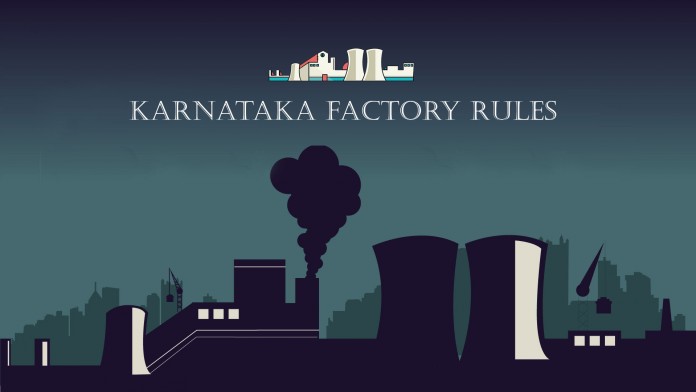In this blog post, Akriti Sarkar, an Associate with Khaitan & Co., Mumbai, and a student pursuing a Diploma in Entrepreneurship Administration and Business Laws by NUJS, provides an overview on licensing rules under the Karnataka Factories Rules, 1969.
Introduction
As per the Indian Constitution, “labor,” related subjects are a part of the concurrent list. Accordingly, both the Centre and the State can make laws on the subject. Provisions relating to Licensing of a factory are stipulated in the Factories Act of 1948 (“Factories Act”). Section 112 of the Factories Act authorizes the respective State Governments to make rules. Section 6 of the Factories Act specifically allows the State Government to make rules for approval, licensing and registration of factories.
The State Government may make rules requiring:
- Submission of plans of any class or description of factories to the Chief Inspector or the State Government;
- The previous permission in writing of the State Government or the Chief Inspector to be obtained for the site on which the factory is to be situated and for the construction or extension of any factory or class or description of factories;

- For the purpose of considering applications for such permission the submission of plans and specifications;
- Prescribing the nature of such plans and specifications and by whom they shall be certified;
- The registration and licensing of factories, or any class or description of factories, and prescribing the fees payable for such registration and licensing and for the renewal of licenses;
- Requiring that no license shall be granted or renewed unless a notice by the Occupier of the factory is given to the Chief Inspector within 15 days before he begins to use the premises (as specified in section 7 of the Factories Act).
Deemed License
The Factories Act lays down that if an application for permission is made and no order is communicated to the applicant within three months from the date on which the application is so sent, the permission applied for in the said application shall be deemed to have been granted.
Right to Appeal
In the case of refusal of permission by the Chief Inspector/State Government, the applicant has the right to approach the State Government /Central Government (as the case may be) within thirty days from the date of such refusal.
Rules Specific to Karnataka
The Karnataka Factories Rules, 1969 (“Factories Rules”) lay down specific rules pertaining to obtaining and renewal of licenses for factories situated in the State of Karnataka.
Application for License
Rule 4 of the Factories Rules stipulates that an occupier of a factory shall submit an application in Form No. 2 for registration of factory and grant of license. Further, premises cannot be used as a factory except in accordance with the license granted under the Factories Rules.
In Karnataka, application for registration and grant of license is required to be made before 15 days of starting a manufacturing activity in the factory to the concerned area inspector with the following docs:
- Registration application in Form 2 signed by the occupier and the manager
- List of directors/partners with the MOA/AOA/partnership deed
- Prescribed fee paid as per Table A and B of the Fee Chart and treasury receipted challan for having paid required registration fees
- Health and safety policy of the proposed factory drawn and duly signed by the Occupier in the case of factories engaged in the hazardous processes as stipulated in the First Schedule of the Factories Act.
Grant of License
A license for a factory is granted by the Chief Inspector in Form No. 3 on payment of specific fees[as stated in Table A and Table B of the Rules]. The license may be granted or renewed for a period (not exceeding three years at a time) and will be specified at the time of the grant or renewal.
In the case of factories working for part of the year and commencing work on or after the first day of July, the fees to be charged the first time would be half of that specified in Tables A and B, subject to a minimum of Rupees forty-five.
Time limit for grant of license: Application made with the above-said documents will be scrutinized by visiting the factory, and the license will be granted after due verification within 30 days.
 If the Chief Inspector refuses to grant or renew the license, he shall record in writing the reasons and communicate the same to the Occupier/applicant.
If the Chief Inspector refuses to grant or renew the license, he shall record in writing the reasons and communicate the same to the Occupier/applicant.
The Factories Rules also reiterate what is stated in the Factories Act regarding deemed approval, i.e., if an application for permission is made and no order is communicated to the applicant within three months from the date on which the application is so sent, the permission applied for in the said application shall be deemed to have been granted.
Amendment of License
Under the Factories Rules, the Chief Inspector also has the authority to amend the license.
A license is required to be amended on the following occasions:
- Change in the name of the factory
- If the factory for which license is granted exceeds the limits specified in the license regarding horsepower of some persons employed.
The Licensee is required to submit an application to the Chief Inspector stating the nature of amendment sought and reason thereof at least 15 days before the date on which the licensee desires to increase the horsepower or number of workers.
The fee for amendment of license is Rupees hundred per change along with the difference in fee that would be payable if the license had originally been issued in the amended form.
Renewal of License
A license may be renewed by the Chief Inspector or an Inspector authorized by him/her.
An application for renewal must be made in Form 2 at least two months before the date on which the license is due to expire.
The fees charged for renewal is the same as that charged at the time of grant. However, if the application for renewal is not made within the time specified, an excess fee of 25% is charged.
Revocation of License
The Chief Inspector and the Deputy Inspector have the power to revoke the license on any ground provided that the licensee is provided with an opportunity to show cause as to why the license should not be revoked.
Transfer of License
An application for transfer to another person has to be made by the license holder to the Chief Inspector, at any time before the expiry of the license along with fees of rupees hundred. If the Chief Inspector approves, he shall under his signature make an endorsement on the license to the effect that the license has been transferred to the person named.
Loss of License
A duplicate license may be granted if the original is lost or accidentally destroyed by payment of fees of rupees two hundred and fifty.
In case of Death or Disability of Licensee
The person carrying on the business of the licensee is not liable to any penalty for exercising the powers granted to the Licensee by the license during such time as may reasonably be required to allow him to make an application for amendment.
Annual Compliance
Annual returns for the year ending the 31st of December, half-yearly returns for the half-year ending 30th June and 31st December. Muster roll of the employees, overall musters for exempted workers.
Responsibility/Duties of Occupier and Manager
An occupier is required to ensure the health, safety and welfare of workers by provision and maintenance of plants/systems that are safe and do not endanger human health. Manufacturers, designers, importers or suppliers of any articles used in a factory must ensure that the article is safe and does not endanger the health of the worker.
The manager is responsible for sending notice to the concerned authorities in case of an accident, dangerous occurrences to the concerned authorities.
Liability for contravention: The manager or occupier shall be liable to the punishment of imprisonment up to two years, depending on the offense committed.
 Serato DJ Crack 2025Serato DJ PRO Crack
Serato DJ Crack 2025Serato DJ PRO Crack











 Allow notifications
Allow notifications


